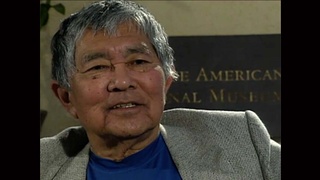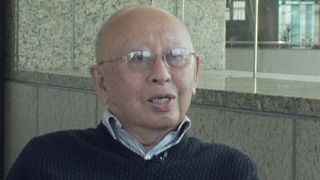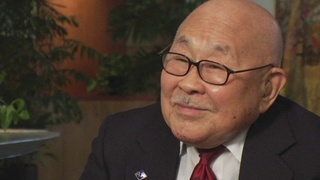Entrevistas
Leaving Tule Lake
We got the train...we got a pass to get on a train. There's no ticket. It's a government official letter to board the train. And I think it was ---. And uh we went to Tule Lake but that train ride itself was horrendous because it was one of the worst... The only thing I can think of is a short film based on that 'cause we could...we never sat together, you know. And I was 11 and Jun, my brother, was 13, and then Shizue. We were split apart because... and every place we stopped from all the way to California, Fresno and all this...you know, wherever the train stopped. There were new passengers coming on with reservations -- seat reservations. You know, and then, we were then told to move. The conductor was very nice and kind. You know, you...you have to go. When there was no seats we went to the smoking room, you know. And the smoking room was what it is: full of smoke. And they're mostly filled with GIs. And the comments would say "What's these Japs doing here?" you know, "in this room," you know. They were just like...we were just like cringing in this corner. And, uh, frightened obviously. But, uh, and there might be one seat open so one of us would go to the, uh, to the thing. When we were all in the train together...once we were all lucky to get two or three seats. Where we could sit together. But most of the time we were split, you know.
I made a painting of that. In my...but the painting was, we were all in two rows of two seats, you know? Which was very moving because I always remembered that. The one thing, that was the redeeming thing, about what I thought about America was this conductor. He was so, so kind, you know. And one time a lady came and said "What's this Jap doing in my seat?!" And he said, "Lady don't use those words." You know that sorta thing. She said, "Get 'em outta here. Go on!" She was...she was kinda hysteria. He said, "Lady sit down over there in that seat and keep your mouth shut." So he gave her this other seat. And I would have moved you know but she had you know like fire in her eyes, ya know. And uh, so I knew that was going to be, that's gonna happen again. So, you know, one must be prepared for that, for this, you know.
Fecha: June 29, 2012
Zona: California, US
Entrevista: Chris Komai, John Esaki
País: Watase Media Arts Center, Japanese American National Museum
Explore More Videos

Regreso a Los Ángeles (Inglés)
Ilustrador japonés americano de Walt Disney y Hanna Barbera (1925-2007)

Grandfather's interrogations during World War II
(n.1952) Antiguo ejecutivo de la banca, nacido en Hawái

Grandparents were incarcerated in Jerome, Arkansas
(n.1952) Antiguo ejecutivo de la banca, nacido en Hawái


Joining WRA Photographic Section
(1923 - 2016) Fotógrafo de la WRA (Autoridad de Reubicación de Guerra)

Grandfather helping administration in camp
(n.1952) Antiguo ejecutivo de la banca, nacido en Hawái

Celebrating his birthday on December 7, 1941
(1914-2015) Líder nisei de la YMCA y de la comunidad japonesa americana

Starting a YMCA program in camp
(1914-2015) Líder nisei de la YMCA y de la comunidad japonesa americana

Leaving Topaz
(1914-2015) Líder nisei de la YMCA y de la comunidad japonesa americana

Leaving a camp to attend college
(1914-2015) Líder nisei de la YMCA y de la comunidad japonesa americana

Keeping Japanese Performance Arts Alive in the Camps
(b. 1932) Actriz de teatro, cine y televisión nisei americana

The Emotional Toll of Being Incarcerated in Camp during World War II
(b. 1932) Actriz de teatro, cine y televisión nisei americana

Sister’s Trauma from being Incarcerated during World War II
(b. 1932) Actriz de teatro, cine y televisión nisei americana

Ganadores/Perdedores
Profesor de doctorado en la Facultad de Derecho de la Universidad de São Paulo, abogado, traductor (nacido en 1948)

